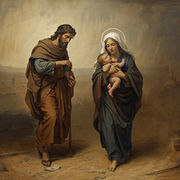Suffering and Transfiguration
- Mar 12, 2022
- 2 min read
Pastor’s Column
2nd Sunday of Lent
March 13, 2022
“Peter said to Jesus, ‘Master, it is good that we are here.
Let us build three tents: one for you; one for Moses; one for Elijah.”
(from Luke 9:28-36)
No pilgrimage to the Holy Land is complete without a visit to Mount Tabor, only about 6 miles from Nazareth in Galilee. The mountain rises about 2000 feet above the plain, with a commanding view. Many years ago I was on a pilgrimage where we had the choice of walking up (like the disciples and Jesus did) or taking the easy way out and using the tour bus (an option Jesus didn’t have!). I decided to take the bus to have more time to explore the church on top (and because it was easier). Those walking up, however, got more than they bargained for: a sudden, unseasonable torrential downpour that left them absolutely soaked when they arrived on top. Though we who took the bus missed the “suffering” of walking to the top, the others had a more memorable and frankly, “biblical” experience of suffering first.
When Peter, James and John were at Mt. Tabor 2000 years ago, they encountered a vision of heaven on earth and, naturally, they did not want to leave. Peter wanted to set up tents for everyone and move in permanently. But Jesus had led the disciples to this mountaintop experience for a reason. He wanted them to see the future, to see the goal, to see Christ in glory, because what was coming was incredible suffering, so much so that all of them would be tempted to lose faith in Christ entirely.
Glory and triumph come after suffering. More specifically, any disciple of Christ’s will be asked to carry his or her share of the cross before being given their own personal transfiguration. The two go together in the gospel like bread and butter. Of course, most of us are looking for a shortcut to this process. Our time on earth, like Christ’s is not a pleasure cruise (occasionally these don’t turn out too well either), but a time of journey, battle, suffering, growth, sacrifice for others and, ultimately, transfiguration.
Love is what you have been through with someone. What kind of friend, spouse, relative or follower of Christ would we be if we were only willing to share glory, happiness, and a care-free existence with the other person? Instead, we prove our love as servants of God, as Saint Paul says in his 2nd letter to the Corinthians “by great fortitude in times of suffering: in times of hardship and distress.” (2 Cor. 6:4-5). To have suffered with someone we love or for someone we love (and this is always for Christ), is to have shared something with them that will last forever. This is what Christ is offering us.
Father Gary
























Comments